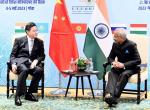US elections are a spectacle and attract enormous media attention. Barring countries like China that have no political interest in exposing their public to such a democratic extravanganza, the media in most others revels even in the trivia of this electoral joust in the world’s pre-eminent power. The India media too has been guilty of excess, devoting inordinate space to irrelevant details.
Impact
Whether Indian reporting was proportionate to genuine public interest, or simply reflected spill from the flood of coverage by the US and western media, can be debated. US democracy is admired by many who are fascinated by the long and gruelling public process which candidates undergo to win voter support. For the US, of course, democracy is a valuable product to sell in the global market place for all to buy, an objective that is promoted by the open and transparent pageant of its presidential elections.
Political developments in the US would evidently attract more than ordinary interest abroad because of America’s weight in international affairs. They have some impact, big or small, on most countries because the US grip on global political, economic and security issues remains strong. Of course, US allies and friends would view electoral change there with equanimity, but not those targetted by the US.
The correlation between power and outside attention to internal developments in countries is evident in the extensive coverage the political transition in China is receiving. Unlike the US media which inundates countries with news and views on the presidential election, the Chinese media generates virtually no background or analytical or human interest material. Mystery and conjecture accompany the opaque Chinese process, inviting deciphering rather than applause. Indian elections receive scant attention internationally because Indian policies do not as yet impinge enough on global developments, especially on international security matters, to capture world-wide public attention.
Some Indians, viewing the contrast between Indian and US elections, especially the public grilling of US politicians and the sparring between the presidential candidates in televised debates, vaunt the US process and recommend emulation. Some European democracies like France, which have elements of a presidential system, have adopted the system of primaries- like the Socialist party there- as well as televised debates betwen contestants. In India, unfortunately, party leadership does not emerge through any publicized internal democratic process. In a two party system or even one with more than two national parties a public debate on national issues by party leaders can be organized so that the voters can better understand the content of political platforms, evaluate promises and individual performance. But with the plethora of parties we have in India, with most being regional or caste based, the adoption of such electioneering methods would not be workable.
Defects
In reality, our system needs a deep overhaul and that should be our priority. We need not therefore be too wistful about missing the US style gladiatorial political contests where “zingers” are sometimes more important than substance, and where personality, wit and repartee seem to sway public opinion more than the record of public service and the wisdom and moderation of policies. The US system has its plus points but glossing over its negative features falsifies the debate.
For one, the two party system there is not inherently logical as it constrains political choice and limits the representative nature of the electoral process. After all, the US is a very diverse country too, with blacks, hispanics and others. Wide income disparities that are becoming more acute exist; a sizable portion of the population is without adequate health care; radical ideas cannot be expressed within the system. That ‘socialism” should be a pejorative word in US democracy, while Europe, the original home of western style democracy, has mainstream socialist parties who alternate in power with conservative or right wing parties, is a commentary on the limitations of “pluralism” in American politics. The bad odour around “government” in US politics is also a peculiar restraint on equity in governance. Taxation is a maligned word too. The moorings of US democracy are highly ideological and do not correspond to what is considered normal and acceptable in other genuine democracies, including the Scandinavian which are often praised for finding the right balance between government and the individual.
Assessment
Those indignant about the increasing role of big money in Indian politics should examine its deleterious role in US politics. Health care reform there is difficult because of the huge spending against it by the insurance lobbies. In the just concluded presidential election both candidates spent several billion dollars each. A handful of big donors have contributed phenomenal amounts of money for the pernicious advertisement campaigns of the two candidates. Most major US banks have supported Romney’s campaign. If the kind of lobbying that the US system permits was prevailing in India, even if it is not for personal profit but to influence policies and legislation, when we are already so sensitive about the grip of a few corporate houses on Indian policy making, we would get exhausted exposing scams.
Statistics show that in the recent presidential election the quasi-totality of blacks and a large majority of hispanics voted for Obama, while white Americans from older age groups and rural areas voted for Romney. This increasing racial and economic cleavage as well as the growing partisan nature of political functioning in the US is being seen as dysfunctional by many thoughtful Americans. US leadership and the American dream have a symbiotic relationship. If the dream fades, the US leadership will wane.
Our adulation of US democracy needs to be tempered with realism, though, with all its deficiencies, US democracy remains a powerful inspiration and insurance for individual freedoms the world over.
Published date: 14th November 2012









Post new comment